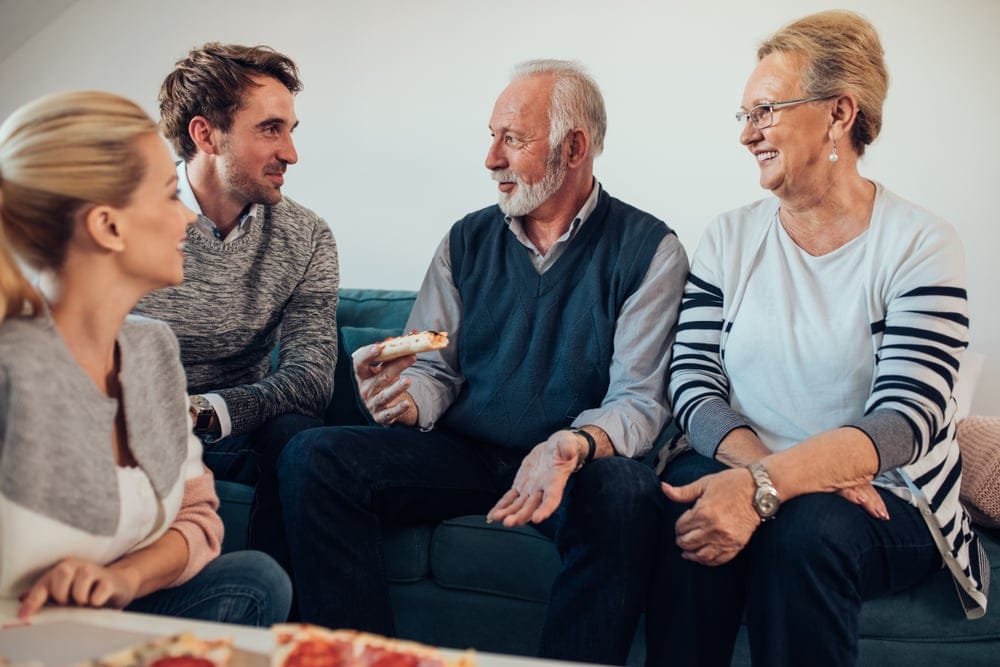Parenting is a complex journey, and not all parents are equipped with the tools to foster a healthy environment for their children. Lots of us grew up hearing toxic things from our parent(s), whether intentional or not. Generational differences, unhealed trauma, and absent-mindedness are all possible reasons behind some of the toxic behaviors we experienced from our parent(s). While it’s important to remember that parents are only human just like us, it doesn’t make their harmful statements any less impactful. Here are 13 toxic things you might’ve heard from your parent(s) and why you shouldn’t let them dictate your beliefs or emotions.
1. “You’re too sensitive.”

Minimizing your emotions is a common tactic used by toxic people to deflect responsibility for their hurtful actions, Psych Central explains. So many people, parents included, hate admitting their mistakes. They don’t want to feel like they’ve failed you or done wrong as a parent, so they try to avoid accountability by turning the blame on you for being upset in the first place. But it’s not on you for feeling however it is that you’re feeling. It doesn’t matter whether or not someone else thinks that they hurt you – because they did. Your feelings are valid, and acknowledging them is crucial for your mental well-being.
2. “I sacrificed everything for you.”

Parents sign up for sacrifices when they become parents, so using this statement as a guilt trip is manipulative. Choosing to become a parent means choosing sacrifices – you didn’t ask for that. Hell, you didn’t even ask for them to birth you! Feeling guilty for existing? Not your gig. Your presence in the world isn’t a burden you forced upon them. Healthy relationships involve mutual support, not emotional guilt trips.
3. “You owe me for everything I’ve done for you.”
Parents should provide for their children out of love, not with the expectation of repayment. Hearing this is like being handed an emotional invoice from your parent(s). Emotional debts can be damaging to your mental health and self-esteem. Gratitude is everything, but it should be a two-way street. You are not indebted to your parents simply for being parents. You should give back to those you want to give back to, not feel bound to reparations because of manipulation. Healthy relationships thrive on genuine exchanges. Love should come with no strings attached.
4. “You’re too young to understand.”

Dismissive statements like these invalidate your perspective. I won’t advise hitting back with a “well, you’re too old to get it” (although tempting… and I may or may not have pulled that one before), but it’s worth noting that generational gaps exist. Their generation has gone through things you don’t understand, but your generation is currently going through things that they don’t understand, either. Age doesn’t always equate to wisdom, and your experiences are valid, regardless of how long you’ve been on earth.
5. “You’re never good enough.”

Toxic parents often use this phrase to undermine their child’s self-esteem. It’s a false belief that constantly telling someone they can do better will make them want to do better when, in reality, it causes people to think they never can. Unrealistic standards are toxic; they cause perpetual feelings of inadequacy. Love your unique qualities and strive for personal growth at your own pace. Remember, your value isn’t tied to someone else’s expectations.
6. “I don’t care what you want.”

Disregarding your desires and opinions can be damaging. Statements like this are used to make you feel like everyone else’s needs take precedence over yours. But your needs don’t deserve to just get thrown into the abyss. Your voice matters; it’s a crucial component of a healthy relationship. Don’t let anyone dim your desires. They’re just as valid as the next person’s.
7. “You’re just like [negative comparison].”

Comparing you to others in a negative light is toxic behavior. Maybe it’s fear talking – ‘you’re just like your alcoholic father’ because you don’t avoid a drink. Or perhaps it’s just a tactic to make you feel lousy about something they don’t like. But guess what? You’re your own person. Your strengths and weaknesses are yours to own, not theirs to dictate. Who asked for an emotional report card, anyway?
8. “You should be more like [another comparison].”

I used to get the rundown of others’ stellar qualities, my parents hoping it’d morph me into a social butterfly like my cousin or make me more academic like my best friend. All it did was make me feel like my parents didn’t like me for me. The truth is, those qualities that you’re being compared to are just a slice of someone else’s pie, not the whole shebang. Everyone has positives and negatives, including you. Comparisons are like apples to oranges – no point and definitely no winner.
9. “You’re the reason for all our problems.”

Ever felt like the scapegoat for all the family drama? Placing blame on a child for familial issues is an unfair burden. As Harvard Business Review explains, toxic folks love displacing blame onto whoever’s an easy target. You cannot be the cause of every family hiccup. It’s more likely they’d rather point the finger to one easy reason, and surprise – it’s often been you. Family dynamics are a maze of complexities, and fixing everything is not solely on your shoulders. Don’t carry the burden of blame when it’s not yours to bear.
10. “I know what’s best for you.”

Parents are guides, not puppeteers. Healthy relationships thrive on mutual respect and open communication. Toxic parents might push dependence, but real success blooms from personal growth and grit. Convincing you to doubt your own abilities is a way toxic parents can discourage independence and maintain control. “I’m doing this for your own good” is just a way to mask controlling behavior. While parents may think keeping you on a short leash is helpful, good intentions don’t excuse harmful actions. Gauge their impact on you. Undermining your ability to think for yourself is fear tactic 101. They probably believe in you more than they let on, so you need to choose to believe in yourself. Your instincts are your compass.
11. “I never said/did that.”

This is infuriatingly common with parents! It’s selective memory at its worst. It’s toxic for parents to deny their actions or gaslight you to dodge responsibility. Trust your memory and ask others if you need backup. “You’re making it all up” is gaslighting. Your experiences are valid, even if they brush them off. Maybe to them, it was just another day. For you, it was trauma. Trust your reality and seek support from those who validate you and your feelings.
12. “You’ll never find anybody who loves you like I/we do.”

Using love as a weapon or bargaining chip is manipulative. Parents sometimes pull this when outside relationships threaten their front-row seat. When they see you forming healthier connections, their “Hail Mary” might be the whole “blood is thicker than water” card. Yes, family is important, but the real MVPs are the relationships that help us be our best selves. Seek relationships that don’t use emotional manipulation to keep you invested.
13. “I’m the victim here.”

Toxic parents may portray themselves as victims to dodge blame, Healthline reveals. They’d rather be on the receiving end of sympathy than the other way around. Let’s be real; in rocky parent-child relationships, our parents have been hurt by us like we’ve been hurt by them (who hasn’t dropped a “screw you, Mom/Dad” before?!). But here’s the kicker – they’re the parents, you were the child. You do not deserve the brunt of the apology responsibility. Healing is a team effort, and everyone plays a role. All parties need to face the truth for true family recovery.
Enjoy this piece? Give it a like and follow Bolde on MSN for more!




